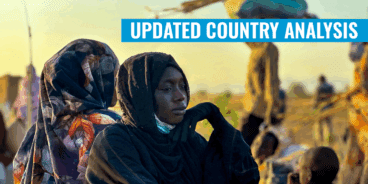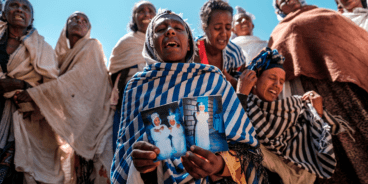

Ethiopia Should Not Be Elected to the UN Human Rights Council
This week the UN General Assembly will elect 18 states to serve a three-year term on the Human Rights Council (HRC) in Geneva. While Ethiopia is running under a non-competitive “clean slate” for the Africa Group, the upcoming election provides an opportunity for governments to demonstrate their unwillingness to vote for unfit candidates. States must receive a simple majority of votes to be elected (i.e., 97), and since voting takes place by secret ballot, states are under no obligation to vote for each candidate within a regional group. Therefore, we, the undersigned organizations, strongly urge your delegation to leave the ballot blank for Ethiopia.
This year, as well as in previous years, many member states seeking election do not live up to the standards set out by the UN General Assembly in Resolution 60/251, which requires states serving on the HRC to “uphold the highest standards in the promotion and protection of human rights.” The Resolution further specifies that “when electing members of the Council, Member States shall take into account the contribution of candidates to the promotion and protection of human rights and their voluntary pledges and commitments made thereto.” Due to these stipulations, we believe Ethiopia’s rights record should disqualify the country from being elected.
The Ethiopian federal government has continually demonstrated a blatant disregard for international humanitarian and human rights law while failing to address unrest and violence in the country. Conflicts have been ongoing and intensified in the Oromia region and flared in the Amhara region. On 14 June 2024 the Office of the UN High Commissioner for Human Rights released a detailed update on the human rights situation in Ethiopia from January 2023 to January 2024, documenting at least 594 incidents of human rights violations during this period, affecting 8,253 victims, with government forces responsible for at least 70 percent of these abuses. Credible reports have also emerged indicating that senior officials in Oromia have continued to order dozens of extrajudicial killings and illegal detentions in its alleged conflict with Oromo armed groups.
Moreover, Ethiopian federal and regional forces committed large-scale abuses during the 2020-2022 war in the Tigray region, which later spread to neighboring Afar and Amhara regions. As documented by the former UN Human Rights Council-mandated International Commission of Human Rights Experts on Ethiopia (ICHREE) and numerous international human rights groups, these abuses may amount to war crimes and crimes against humanity. The crimes include indiscriminate bombings, ethnic-based killings, sexual violence, forced displacement, destruction of cultural heritage and the systematic destruction of food, water and health infrastructure.
Research from Physicians for Human Rights and the Organization for Justice and Accountability in the Horn of Africa confirms that conflict-related sexual violence continued unabated in Tigray even in the months following the 2022 Cessation of Hostilities Agreement. Meanwhile, reports from Amnesty International and Human Rights Watch found that Amhara regional forces and militias, along with the allied Eritrean forces – operating with the complicity of the federal government – continue to be responsible for the ongoing ethnic cleansing of Tigrayans from Western Tigray, which remains under their control.
Additionally, the CIVICUS Monitor has continuously rated Ethiopia’s civic space as ‘repressed’ due to the continued crackdown on civic space, political opponents, journalists and activists. Human rights groups have documented ever-increasing pressures on human rights defenders, critics and civil society in the country with the government targeting long-standing civil society organizations and their personnel with harassment, physical and digital surveillance, intimidation and threats.
Ethiopian authorities have also demonstrated their unwillingness to fully cooperate with the HRC by impeding and blocking the work of ICHREE inside the country. In March 2023 the Ethiopian government lobbied for a resolution to prematurely end ICHREE’s mandate, a move unprecedented in the Council’s history. In October 2023 the international community allowed the Commission’s mandate to lapse. Member States elected to the HRC are expected to fully cooperate with the HRC and its mechanisms and Ethiopia’s actions clearly violate this obligation.
Member states should only support candidates with the strongest human rights records. The HRC was created to replace the Human Rights Commission, whose credibility was delegitimized in large part due to the participation of states with abusive human rights records. To safeguard the integrity of the HRC and fulfill the vision of its founders, we urge member states of the UN General Assembly to rigorously apply the membership criteria outlined in Resolution 60/251 when casting their secret ballots, prioritizing human rights considerations. Ethiopia falls far short of the minimum criteria for membership, and its election would severely undermine the mandate and credibility of the Council.
Sincerely,
- CIVICUS
- Coalition for Genocide Response
- Global Centre for the Responsibility to Protect
- International Bar Association’s Human Rights Institute
- Irob Anina Civil Society
- Legacy Tigray
- Omna Tigray
- Organization of Justice and Accountability in the Horn of Africa
- Oromo Legacy Leadership and Advocacy Association
- Physicians for Human Rights
- Victim Advocates International
Related Content


Populations at Risk, November 2025
